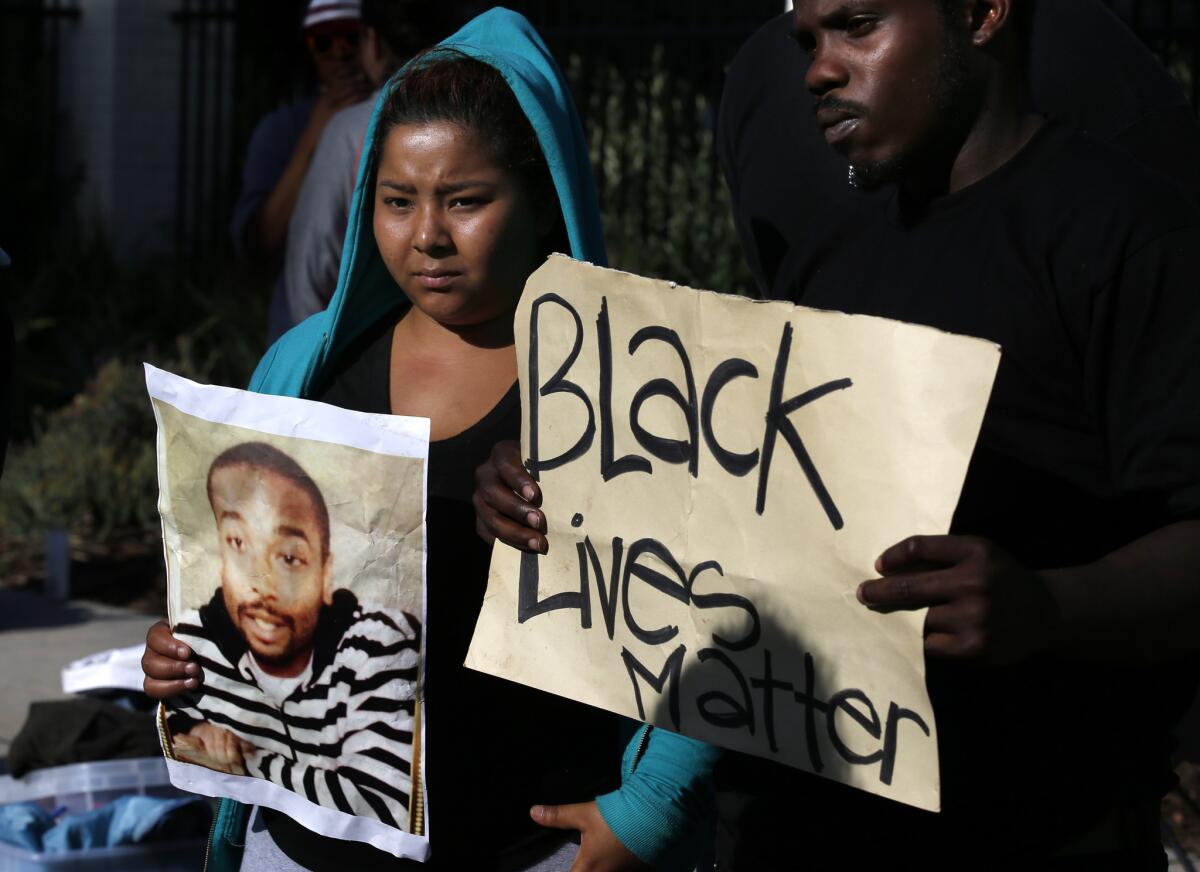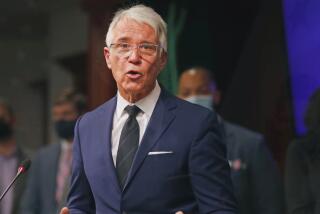Column: ‘I will shoot you’ isn’t a great campaign slogan for D.A. Jackie Lacey

- Share via
I hate the overuse of the term “bad optics.” But when you’re running for another term as L.A. County district attorney and your husband stands in the doorway of your house with a gun and threatens to shoot someone, the day before the election, that can fairly be described as bad optics.
This happened Monday morning at the Granada Hills home of D.A. Jackie Lacey, a two-term incumbent whose reelection bid has divided the community and stirred activists, including members of Black Lives Matter.
Some of those activists, who have blasted the African American D.A. for not being tougher in officer-involved shootings and other high-profile cases, gathered outside Lacey’s home at dawn to protest her performance and what they say is her months-long refusal to meet with them.
What happened next was captured on a video that spread faster than a wildfire.
“Get off my porch,” Lacey’s husband, David, says in a threatening tone as he stands in his doorway, arm extended, finger on the trigger of a sizable, no-nonsense gun.
“Are you going to shoot me?” responds a female visitor.
“I will shoot you,” says Lacey’s husband. “Get off of my porch.”
“Can you tell Jackie Lacey that we’re here?” he is asked.
“I don’t care who you are,” he responds, ordering the woman off his porch and saying he would call the police. Then he closes the door.
“He pulled a gun and pointed it at my chest,” a female voice says.
It was an ugly scene, and it raised lots of questions.
No matter how ticked off he might have felt about his wife being harassed, was it appropriate for Lacey’s husband to point a gun at protesters?
Of course not.
He’d have been better off not answering the door at all, or calling police in the first place. Unless he thought the protesters were armed or planning to burst into his house, waving the gun around was a reckless and potentially dangerous thing to do, and there’s even a question of whether his antics could be interpreted as a crime.
And here’s another question:
Was it fair of protesters to go to the private home of a public official and invade her privacy?
That’s a tougher one to answer, but I have to come clean here and admit that over the long course of my career as a journalist, I have on occasion taken extra steps to confront those who were trying to avoid me.
Lacey’s protesters say they were promised a meeting that never happened. Typically, they have protested outside her downtown Los Angeles office, sometimes reciting names of victims shot by police.
Protesting at the office is fair play, for sure. Going to Lacey’s house Monday morning was a way to make a statement, but on the day before the election, it clearly was also a political stunt.
Jasmyne Cannick, a longtime activist and current communications director for Lacey foe Rachel Rossi, said she can understand a public official not being happy about having protesters on the front porch. But she offered some context in the case of Lacey.
“The short and skinny of it for me,” said Cannick, is that Lacey has avoided a core constituency of black voters who take issue with her job performance. “People are frustrated and angry .... She shows up for meetings with other constituencies.”
Last October, Cannick said, Lacey agreed to meet with critics on her handling of a West Hollywood case involving the deaths of young black men at the home of a white Democratic fundraiser, but she reneged. After a January debate with her opponents in the D.A.’s race, Rossi and George Gascón, Lacey cited protests as a reason to bow out of future debates.
These political blunders by Lacey only fueled the rage of her critics.
On Monday, a few hours after the incident at her home, a visibly shaken Lacey held a news conference in which she was emotional, personal and defensive.
She said her husband was “profoundly sorry” for what he had done and wanted protesters to know he didn’t intend to harm anyone. She said she had always performed her job as dictated by facts and laws, and she spoke of a newfound courage. But I saw what looked more like fatigue than resolve.
As to whether Lacey had reneged on promised meetings with critics, she said:
“In the past I have offered to meet with Black Lives Matter, but I felt it should be one on one or a small group. They have rejected those offers. It seems like what they like is to embarrass me and intimidate me.”
She drew a line on protests at her home.
“Believe it or not, the Laceys are private people,” she said. “We expect people will exercise their 1st Amendment right, but our home is our sanctuary and we do not believe, I don’t believe, it is fair or right for protesters to show up at the homes of people who dedicate their lives to public service.”
I can certainly understand her perspective, but I think she could have defused the tension and avoided Monday morning’s debacle by meeting with her critics.
When you’re elected to public office, you do naturally surrender some privacy, and it’s time to look for another job when the cost becomes too high. Avoiding critics is a sign of weakness. Hearing them out could lead to better understanding all around — or at least defuse a bad situation. I’m wondering now if Lacey, whose support is strong in the law enforcement community, is too damaged to be an effective leader going forward.
That said, I’ve admired Lacey for her rise as a female of color and for, among other things, her focus on diverting people out of the traditional justice system when their crimes are likely caused by mental illness, although we are by no means where we should be on that front. The local jails still serve as mental institutions for thousands.
Late last year, Lacey was among a local delegation that visited Trieste, Italy, to study a better system. I was along on that trip, and one night, as public officials shared notes, Lacey passionately delivered a call to conscience on the creation of more humane alternatives to incarceration.
It’s hard to know whether and how the scene Monday at Lacey’s home will affect the outcome of the election.
Some might be won over by Lacey’s personal and honest response to a divisive political culture, and what she saw as an overstep by critics.
Others might think they were witnessing the end for someone who’s been on the job long enough, if not a little too long.
More to Read
Sign up for Essential California
The most important California stories and recommendations in your inbox every morning.
You may occasionally receive promotional content from the Los Angeles Times.











